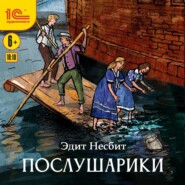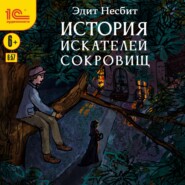По всем вопросам обращайтесь на: info@litportal.ru
(©) 2003-2024.
✖
Wet Magic
Настройки чтения
Размер шрифта
Высота строк
Поля
“Oh, do get in,” said Kathleen, dancing with anxiety, “I’m sure Aunt Enid won’t mind,” – Kathleen was always hopeful – “suppose the train were to start or anything!”
“Well, if you think I may,” said the lady, and tossed her paper into the corner in a lighthearted way which the children found charming. Her pleasant face was rising in the oblong of the carriage doorway, her foot was on the carriage step, when suddenly she retreated back and down. It was almost as though someone pulled her off the carriage step.
“Excuse me,” said a voice, “this carriage is reserved.” The pleasant face of the lady disappeared and the – well, the face of Aunt Enid took its place. The lady vanished. Aunt Enid trod on Kathleen’s foot, pushed against Bernard’s waistcoat, sat down, partly on Mavis and partly on Francis and said – “Of all the impertinence!” Then someone banged the door – the train shivered and trembled and pulled itself together in the way we all know so well – grunted, snorted, screamed, and was off. Aunt Enid stood up arranging things on the rack, so that the children could not even see if the nice lady had found a seat in the train.
“Well – I do think – ” Francis could not help saying.
“Oh – do you?” said Aunt Enid, “I should never have thought it of you.”
When she had arranged the things in the rack to her satisfaction she pointed out a few little faults that she had noticed in the children and settled down to read a book by Miss Marie Corelli. The children looked miserably at each other. They could not understand why Mother had placed them under the control of this most unpleasant mock aunt.
There was a reason for it, of course. If your parents, who are generally so kind and jolly, suddenly do a thing that you can’t understand and can hardly bear, you may be quite sure they have a good reason for it. The reason in this case was that Aunt Enid was the only person who offered to take charge of the children at a time when all the nice people who usually did it were having influenza. Also she was an old friend of Granny’s. Granny’s taste in friends must have been very odd, Francis decided, or else Aunt Enid must have changed a good deal since she was young. And there she sat reading her dull book. The children also had been provided with books —Eric, or Little by Little;Elsie, or Like a Little Candle;Brave Bessie and Ingenious Isabel had been dealt out as though they were cards for a game, before leaving home. They had been a great bother to carry, and they were impossible to read. Kathleen and Bernard presently preferred looking out of the windows, and the two elder ones tried to read the paper left by the lady, “looking over.”
Now, that is just where it was, and really what all that has been written before is about. If that lady hadn’t happened to look in at their door, and if she hadn’t happened to leave the paper they would never have seen it, because they weren’t the sort of children who read papers except under extreme provocation.
You will not find it easy to believe, and I myself can’t see why it should have happened, but the very first word they saw in that newspaper was Beachfield, and the second was On, and the third was Sea, and the fifth was Mermaid. The fourth which came between Sea and Mermaid was Alleged.
“I say,” said Mavis, “let’s look.”
“Don’t pull then, you can see all right,” said Francis, and this is what they read together:
BEACHFIELD-ON-SEA – ALLEGED MERMAID. AMAZING STORY.
“‘At this season of the year, which has come to be designated the silly season, the public press is deluged with puerile old-world stories of gigantic gooseberries and enormous sea serpents. So that it is quite in keeping with the weird traditions of this time of the year to find a story of some wonder of the deep, arising even at so well-known a watering place as Beachfield. Close to an excellent golf course, and surrounded by various beauty spots, with a thoroughly revised water supply, a newly painted pier and three rival Cinematograph Picture Palaces, Beachfield has long been known as a rising plage of exceptional attractions, the quaint charm of its…’”
“Hold on,” said Francis, “this isn’t about any old Mermaid.”
“Oh, that’ll be further on,” said Mavis. “I expect they have to put all that stuff in to be polite to Beachfield – let’s skip – ‘agreeable promenade, every modern convenience, while preserving its quaint…’ What does quaint mean, and why do they keep on saying it?”
“I don’t think it means anything,” said Francis, “it’s just a word they use, like weird and dainty. You always see it in a newspaper. Ah – got her. Here she is – ‘The excitement may be better imagined than described’ – no, that’s about the Gymkhana – here we are:
“‘Master Wilfred Wilson, the son of a well-known and respected resident, arrived home yesterday evening in tears. Inquiry elicited a statement that he had been paddling in the rock pools, which are to be found in such profusion under the West Cliff, when something gently pinched his foot. He feared that it might be a lobster, having read that these crustaceans sometimes attack the unwary intruder, and he screamed. So far his story, though unusual, contains nothing inherently impossible. But when he went on to state that a noise “like a lady speaking” told him not to cry, and that, on looking down, he perceived that what held him was a hand “coming from one of the rocks under water,” his statement was naturally received with some incredulity. It was not until a boating party returning from a pleasure trip westward stated that they had seen a curious sort of white seal with a dark tail darting through the clear water below their boat that Master Wilfred’s story obtained any measure of credence.’”
(“What’s credence?” said Mavis.
“Oh, never mind. It’s what you believe with, I think. Go on,” said Francis.)
“‘ – of credence. Mr. Wilson, who seems to have urged an early retirement to bed as a cure for telling stories and getting his feet wet, allowed his son to rise and conduct him to the scene of adventure. But Mr. Wilson, though he even went to the length of paddling in some of the pools, did not see or feel any hands nor hear any noise, ladylike or otherwise. No doubt the seal theory is the correct one. A white seal would be a valuable acquisition to the town, and would, no doubt, attract visitors. Several boats have gone out, some with nets and some with lines. Mr. Carrerras, a visitor from South America, has gone out with a lariat, which in these latitudes is, of course, quite a novelty.’”
“That’s all,” whispered Francis, and glanced at Aunt Enid. “I say – she’s asleep.” He beckoned the others, and they screwed themselves along to that end of the carriage farthest from the slumbering aunt. “Just listen to this,” he said. Then in hoarse undertones he read all about the Mermaid.
“I say,” said Bernard, “I do hope it’s a seal. I’ve never seen a seal.”
“I hope they do catch it,” said Kathleen. “Fancy seeing a real live Mermaid.”
“If it’s a real live Mermaid I jolly well hope they don’t catch her,” said Francis.
“So do I,” said Mavis. “I’m certain she would die in captivity.”
“But I’ll tell you what,” said Francis, “we’ll go and look for her, first thing tomorrow. I suppose,” he added thoughtfully, “Sabrina was a sort of Mermaid.”
“She hasn’t a tail, you know,” Kathleen reminded him.
“It isn’t the tail that makes the Mermaid,” Francis reminded her. “It’s being able to live underwater. If it was the tail, then mackerels would be Mermaids.”
“And, of course, they’re not. I see,” said Kathleen.
“I wish,” said Bernard, “that she’d given us bows and arrows instead of pails and spades, and then we could have gone seal-shooting – ”
“Or Mermaid-shooting,” said Kathleen. “Yes, that would have been ripping.”
Before Francis and Mavis could say how shocked they were at the idea of shooting Mermaids, Aunt Enid woke up and took the newspaper away from them, because newspapers are not fit reading for children.
She was somehow the kind of person before whom you never talk about anything that you really care for, and it was impossible therefore to pursue either seals or Mermaids. It seemed best to read Eric and the rest of the books. It was uphill work.
But the last two remarks of Bernard and Kathleen had sunk into the minds of the two elder children. That was why, when they had reached Beachfield and found Mother and rejoiced over her, and when Aunt Enid had unexpectedly gone on by that same train to stay with her really relations at Bournemouth, they did not say any more to the little ones about Mermaids or seals, but just joined freely in the chorus of pleasure at Aunt Enid’s departure.
“I thought she was going to stay with us all the time,” said Kathleen. “Oh, Mummy, I am so glad she isn’t.”
“Why? Don’t you like Aunt Enid? Isn’t she kind?”
All four thought of the spades and pails and shrimping nets, and of Eric and Elsie and the other books – and all said:
“Yes.”
“Then what was it?” Mother asked. And they could not tell her. It is sometimes awfully difficult to tell things to your mother, however much you love her. The best Francis could do was:
“Well – you see we’re not used to her.”
And Kathleen said: “I don’t think perhaps she’s used to being an aunt. But she was kind.”
And Mother was wise and didn’t ask any more questions. Also she at once abandoned an idea one had had of asking Aunt Enid to come and stay at Beachfield for part of the holidays; and this was just as well, for if Aunt Enid had not passed out of the story exactly when she did, there would not have been any story to pass out of. And as she does now pass out of the story I will say that she thought she was very kind, and that she meant extremely well.
There was a little whispering between Francis and Mavis just after tea, and a little more just before bed, but it was tactfully done and the unwhispered-to younger ones never noticed it.
The lodgings were very nice – a little way out of the town – not a villa at all as everyone had feared. I suppose the landlady thought it grander to call it a villa, but it was really a house that had once been a mill house, and was all made of a soft-colored gray wood with a red-tiled roof, and at the back was the old mill, also gray and beautiful – not used now for what it was built for – but just as a store for fishing nets and wheelbarrows and old rabbit hutches and beehives and harnesses and odds and ends, and the sack of food for the landlady’s chickens. There was a great corn bin there too – that must have been in some big stable – and some broken chairs and an old wooden cradle that hadn’t had any babies in it since the landlady’s mother was a little girl.
On any ordinary holiday the mill would have had all the charm of a magic palace for the children, with its wonderful collection of pleasant and unusual things to play with, but just now all their thoughts were on Mermaids. And the two elder ones decided that they would go out alone the first thing in the morning and look for the Mermaid.
Mavis woke Francis up very early indeed, and they got up and dressed quite quietly, not washing, I am sorry to say, because water makes such a noise when you pour it out. And I am afraid their hair was not very thoroughly brushed either. There was not a soul stirring in the road as they went out, unless you count the mill cat who had been out all night and was creeping home very tired and dusty looking, and a yellowhammer who sat on a tree a hundred yards down the road and repeated his name over and over again in that conceited way yellowhammers have, until they got close to him; and then he wagged his tail impudently at them and flew on to the next tree where he began to talk about himself as loudly as ever.
This desire to find the Mermaid must have been wonderfully strong in Francis, for it completely swallowed the longing of years – the longing to see the sea. It had been too dark the night before to see anything but the winking faces of the houses as the fly went past them. But now as he and Mavis ran noiselessly down the sandy path in their rubber shoes and turned the corner of the road, he saw a great pale-gray something spread out in front of him, lit with points of red and gold fire where the sun touched it. He stopped.
“Mavis,” he said, in quite an odd voice, “that’s the sea.”
“Yes,” she said and stopped too.
“It isn’t a bit what I expected,” he said, and went on running.

















